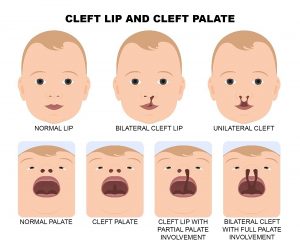Summarize This Article:
Summarize This Article:


January is National Birth Defects Awareness Month. This month aims to raise awareness about birth defects and highlight efforts to improve the quality of life of individuals living with these conditions. There are many reasons that birth defects can occur. Due to advancements in medicine and craniofacial surgery, babies born with birth defects are thankfully able to live full, healthy lives.
Not all birth defects can be prevented; however, if you manage certain health conditions and implement healthy habits before conceiving, there is a better chance of preventing certain birth defects.
Here are some ways you can be your healthiest prior to and during pregnancy:
Be sure to take plenty of Folic Acid. Folic acid, a B vitamin, is very beneficial for preventing birth defects that can develop in babies’ brains or spines (anencephaly or spina bifida). You can get folic acid through your diet, via supplements, or a combination of the two.
Keep diabetes at bay. Diabetes that is not managed properly can increase the risk of birth defects. Make sure to see your healthcare provider or dietician regularly before and during pregnancy if you have diabetes.
Stay away from alcohol during pregnancy. Consuming alcohol during pregnancy is not recommended. This is because alcohol in a woman’s bloodstream can pass to the baby. Drinking alcohol during pregnancy can cause many disabilities, as well as increase the chances of a miscarriage or stillbirth.
Avoid drugs and smoking. Most people know to avoid using drugs or smoking cigarettes, or use of other tobacco products during pregnancy, but it cannot be stressed enough. Women using marijuana for medical reasons should consult with their physician to find a safer alternative during pregnancy. Smoking cigarettes and use of other tobacco products have been linked to birth defects such as cleft lip or cleft palate. It is best to quit smoking before getting pregnant. For women who have already conceived, quitting as early as possible can still help protect against some health problems for the baby, such as low birth weight.
Talk to your healthcare provider about vaccinations. Most vaccines are safe during pregnancy, and some, such as the flu vaccine and others, are specifically recommended during pregnancy. COVID-19 vaccination is recommended for people who are pregnant, trying to get pregnant now, or might become pregnant in the future. Getting a COVID-19 vaccine during pregnancy can protect you from severe illness. Talk to your healthcare provider to determine what is right for you.
Pregnancy is a very exciting time! Although there are often stressors and a lot of unknowns that come up, being as prepared as possible and confident about your healthcare plan will alleviate most of your worries.
Resources:
https://www.cdc.gov/ncbddd/birthdefects/awareness-month/before-during-pregnancy.html


